Someone knocked on my cabin door. I opened it to a fellow in Gore-Tex and a life jacket, holding a towel, looking at me in mild desperation.
“Hi, I’m Iain. Can I use your shower?”
In any other circumstance I might have felt uncomfortable, but I was warned that Iain or other staff from the Port Lockroy base might ask. So I obliged.
I was a guide on a Quark Expeditions vessel. The four staff members at this Antarctic base didn’t have running water, so before taking our passengers ashore, they came onboard to shower and do laundry.
That was February 2016. A year later I am back as a guide again, aboard the Ocean Endeavor.
Wiencke Island, off the Antarctic Peninsula, is truly spectacular. The 1,000-meter-plus peaks and glaciers transform the bay into an amphitheater. We are visiting Port Lockroy, the British-base-turned-museum, gift shop, and post office. “Lockroy” is derived from LaCroix, named by the French who discovered it. It is one of the most popular sites in Antarctica.
Passengers negotiate the slick granite shore. A rusting chain lies over the rock. In the early 1900s whaling ships moored here; lying on the nearby shore are great arched ribs, stool-size vertebrae, and massive skulls.
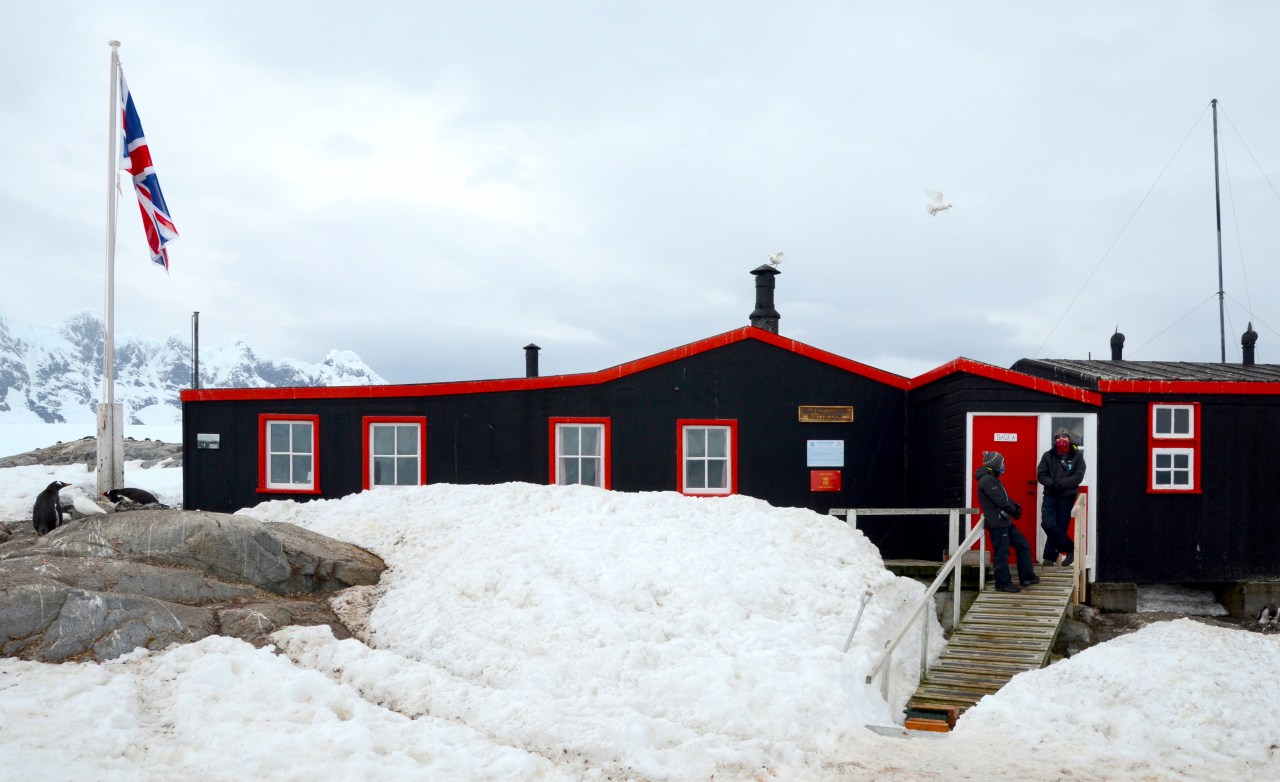
Atop the tiny island now stands Bransfield House, an old dogsled, and a flagpole flying the Union Jack. During World War II the British military reoccupied the island as a base for the mission code-named Operation Tabarin. Port Lockroy became Base A.
Operation Tabarin was fundamentally territorial. The Nazis were mounting exhibitions to the Antarctic, while Argentine and American intentions worried the British as well. So Britain established Base A: the country’s first permanent Antarctic base.
I walk up to Bransfield House. Outside I use boot brushes to remove guano. Inside I breathe the musky smell of old cabin and walk toward the chatter and clomp of boots—the gift shop.
Postcards, books, Antarctic-tartan ties and scarves, stuffed penguins, and other Antarctic commodities crowd the shelves. The shop is remarkably well stocked. Two women at the cash register are scanning and bagging purchases. They accept dollars, pounds, and euros; a generator and satellite connection mean they accept credit cards, too. We could be anywhere except that the shopkeepers are in winter gear—it’s chilly.
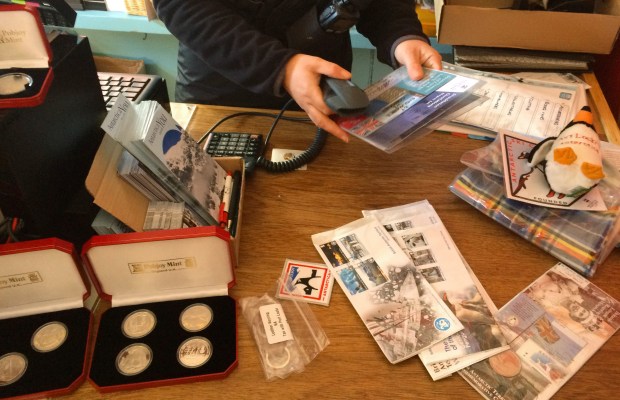
Between passengers, I find respite to chat with one of the women I recognize from last year: Adele Jackson, the base leader. I ask her how many visitors pass through the shop.
“On average, two ships a day and a yacht every other. We have a daily limit of 350. Over the season it works out to be about 15,000.”
I can’t imagine traveling to the end of the Earth to work in retail. I ask Jackson what brought her here.
“I’ve wanted to experience life in Antarctica for many years, not just to visit. My professional background is in arts and culture, so I wanted to use these skills. I worked on one of the Antarctic cruise expedition ships as a photographer. I visited Lockroy and thought it would be an amazing place to live and work. So I applied for the job.”
Today the base is run by the U.K. Antarctic Heritage Trust, which conserves and supports British Antarctic history. Money from the gift shop funds the organization’s projects.
At the entrance is a red British postbox. Lockroy is the southernmost civilian post office in the world.
“One of the things the team did in order to reassert the sovereignty claim was to run a post office and issue ‘British Graham Land’ stamps. Postage stamps are a form of currency, so having the post office meant that the British could legitimately claim to have a currency in operation.”
While visitors enjoy the novelty of sending letters from Antarctica, they unknowingly reinforce the British claim.
I explore the rest of the building: a tiny office with an old typewriter, a radio room, and a kitchen. In the pantry, the shelves are lined with yellowing Quaker Oats labels, rusty cans of beans, and Bovril.
Across the hall is the area where personnel dined and drank. There’s a tiny bar. Today passengers busily write letters.
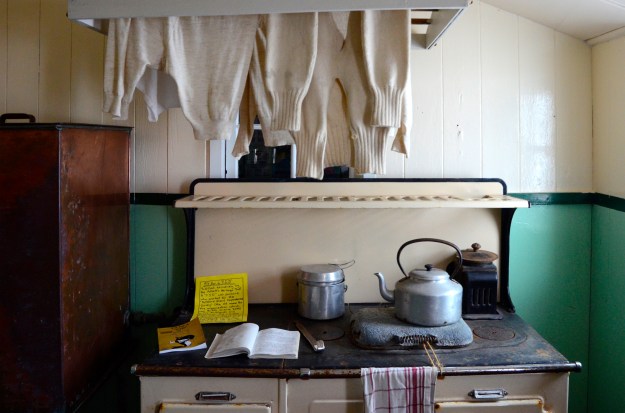
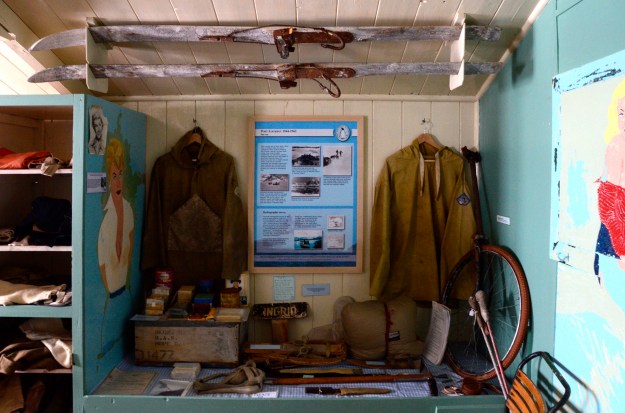
The adjoining room houses instruments. In the middle is Beastie, an enormous gray box of dials and switches once used to study radio transmission.
The military personnel stationed here—nine in the summer, four in the winter—also studied marine biology, geology, and meteorology. Postwar, as a civilian base, the first investigations of the ionosphere were done here, anticipating the discovery of the ozone hole.
In the living quarters, beds lie made and cold-weather gear fills the shelves. To pass the time in isolation, men painted the walls with renditions of Marilyn Monroe and Doris Day.
I return to ask Jackson about contemporary life.
“We have four daily duties that are rotated between the team: cooking, cleaning, base diary, and gash. ‘Gash’ is an old nautical term which has come to mean emptying the wastewater and toilet buckets. There is no plumbing.”
Life at Lockroy is basic: no running water, limited electricity and heating, radio and satellite telephone communication only, and water either melted from ice or collected from ships.
The season extends through summer, from November to March. It’s not too bad for Antarctica—typically a couple degrees above freezing.
It’s also very busy. Before ships arrive, the four staff are up early, shovelling snow and scrubbing off penguin guano. They get the generator running and the museum and shop ready. Once visitors leave, the shop is restocked, sales accounted, and the building cleaned.
There’s also sorting mail, communicating with ships, reports, inventory, curating, household duties, and penguin observation.
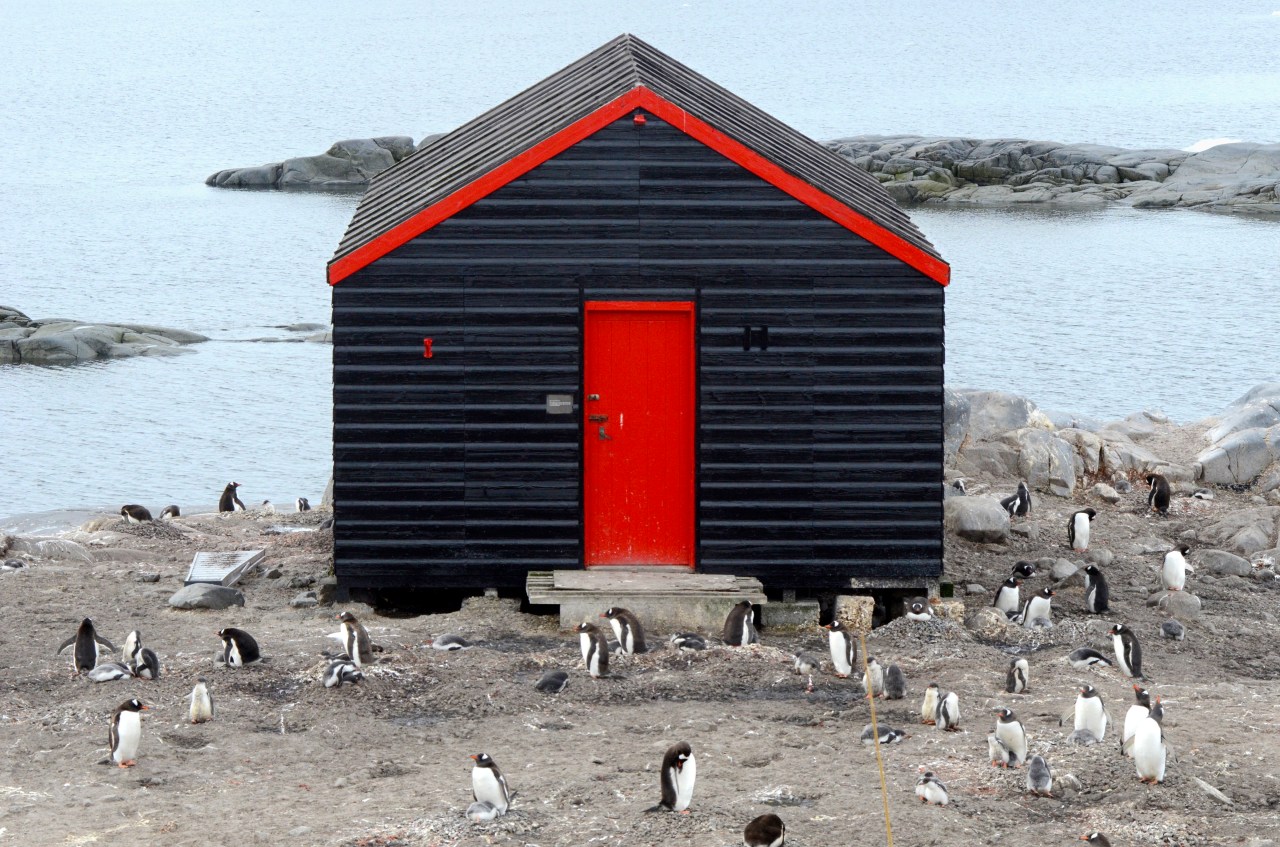
I ask Jackson, “How’s life among penguins?”
“Amazing. Watching the subtleties of their behavior— I love the way they blink their eyes, the way they bow to their partners, the way they carefully arrange stones around their nests.”
“Have you lost your sense of smell?”
“Unfortunately not.”
“And what’s the first thing you want to do after leaving Lockroy?”
“Take a long hot shower, wash my coat (it smells like penguin), and hike a high mountain.”
It’s February and Lockroy will be closing for the season. While Base A once operated year-round, today it’s only open in the summer. Gentoo chicks have nearly lost their down and will be heading to sea. Jackson and her three companions will leave too, on a ship to Argentina and a plane to the U.K., where they will relish hot showers and memories of postcards, penguins, and solitude.